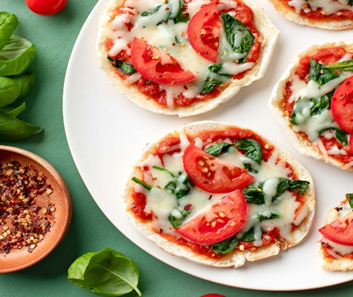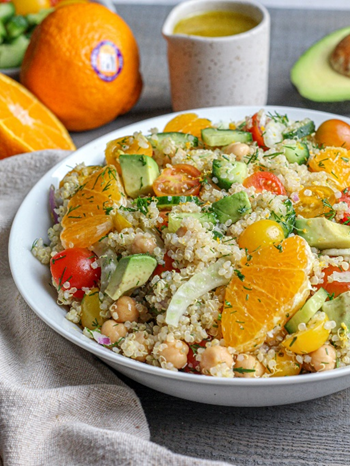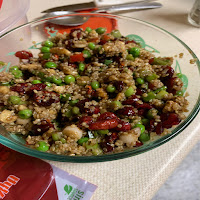Holistic Habits by Cheryl A. Mothes, Ph.D. Natural Health Nutrition Counselor
Content
is a daily radio script from my KHIS radio spot - tune in at 6:15 (CST) every
morning to Justin and Meredith’s morning show on 89.9 FM.
In our quest for better health, we often come across various compounds and dietary choices that can make a significant impact on our well-being. Today, we explore ergothioneine, a lesser-known amino acid associated with longevity, and discuss the importance of healthy eating choices, particularly in hospitals. We also share a delicious and nutritious Pita Pizza recipe for Fix-it Friday, and discover how a low-fat, plant-based diet can help you thwart headache pain. Let's dive into these topics and recipes to boost your health and overall well-being!
Monday: Embrace Ergothioneine for a Longer, Healthier Life
Ergothioneine, sometimes referred to as the longevity vitamin, is a powerful compound associated with lower rates of disease and death. Low blood levels of ergothioneine have been linked to an increased risk of various health issues, including frailty, cardiovascular disease, cognitive impairment, dementia, and Parkinson's disease. Fortunately, mushrooms and tempeh, which are not only delicious but also rich in ergothioneine, can help you maintain good health. Add them to your diet to live longer and stronger!
Transition
Tuesday: Plan for Healthier Eating
One of the best investments you can make in your health is to evaluate your current eating habits. Spend some time listing the foods you and your family consumed during the past week and identify ways to make them healthier. Swap processed foods for options with more vegetables, grains, and beans. Incorporate fruits into your daily routine as snacks or in a morning fruit bowl. Consider a green and fruity smoothie but skip the processed powders and cow's milk. Transitioning to a healthier diet takes planning and effort, but the benefits are worth it.
Wonderful Wednesday: Mushrooms and Tempeh for a Stronger Immune System
Studies have shown that consuming mushrooms regularly can improve immune function and reduce the risk of developing dementia. These amazing fungi also lower the risk of cancer and premature death. So, on this wonderful Wednesday, make sure to include mushrooms and tempeh in your meals. Add them to your soups, pasta sauces, or salads for a boost in longevity and vitality.
Thursday: Reevaluate Hospital Food for Your Health
It's shocking to learn that many hospitals have fast-food restaurants inside them, but what about the food served in hospital cafeterias? Unfortunately, a significant majority of hospital entrees are far from healthy, with only 7 percent classified as nutritious. Unhealthy impulse buys like ice cream, cookies, and candy are often found near the checkout register, and some hospitals even encourage unhealthy eating. The emphasis on profit often takes precedence over promoting health. With more physicians focusing on lifestyle medicine, we hope to see positive changes in this trend.
Fix-it Friday: Delight in Pita Pizzas
Kickstart your weekend with a delicious and nutritious Pita Pizza recipe. These Pita Pizzas are not only tasty but also healthy. They feature chickpea-based hummus, whole-wheat pitas, and a variety of delicious toppings. Whether you opt for baked or fresh toppings, these Pita Pizzas are a perfect way to enjoy a guilt-free and scrumptious meal.
Pita Pizzas Ingredients:-
1 1/2 cup chickpeas
-
2 tablespoons lemon juice
-
1 teaspoon tahini
-
1 clove garlic
-
1/4 teaspoon ground black pepper
-
1/2 red pepper, soaking in water
-
1/4 teaspoon ground cumin
-
2 whole-wheat pitas
-
Freshly cracked black pepper
-
Baked toppings (optional): Thyme, green olives, roasted garlic, sun-dried
tomatoes, red peppers, onions
- Fresh toppings (optional): Sliced basil, Roma tomatoes, Peppadew peppers, arugula
Pita
Pizzas Directions:
1. To make the hummus, place cooked chickpeas (if canned, drain and rinse) in a food processor or blender with lemon juice, tahini, garlic, 1/4 teaspoon ground black pepper, cumin, and the water-soaked red pepper. If more liquid is needed, add more lemon juice or water. Garlic, cumin, and black pepper can be adjusted for personal taste preferences.
2. Spread 1/4 cup of this hummus over each pita, except for the edge. Reserve any leftover hummus for future use. Sprinkle each pita with cracked black pepper. Add the baked toppings (the toppings that get baked on top of the pizza; they do not need to be baked before this step). As a variation, add pizza sauce instead of hummus.
3. Bake the pita pizzas at 350°F for 7 to 8 minutes. Then add any fresh toppings to the pizzas after they come out of the oven.
Source: 21-Day Weight Loss Kickstart by Neal Barnard, MD; recipe by Jason Wyrick of the Vegan Culinary Experience
Special Edition - Thwart Headache Pain with Low-Fat and No Sodas
Headaches are a common ailment, and their triggers can vary. In terms of dietary solutions, a plant-based diet has shown promise in reducing nerve inflammation associated with migraines. Studies indicate that individuals on a low-fat diet, consuming less than 30 grams of fat per day, experienced a significant decrease in the frequency and intensity of headaches. Monitoring your fat intake can make a significant difference in your headache management. Also, consider reducing or eliminating soda from your diet, as it has been found to alleviate headaches for many due to its potential inflammatory effects.
Fix-it Friday: Slow Cooker Red Lentil and Sweet Potato Curry
End your week with a delicious and healthy recipe - Slow Cooker Red Lentil and Sweet Potato Curry. This flavorful dish features a variety of spices and vegetables, providing a satisfying and nutritious meal. Enjoy it with quinoa or brown rice, and don't forget the lime wedges for an extra burst of flavor.
Ingredients:
- 1 32-ounce container of low-sodium vegetable broth-
4 ½ cups 1-inch cubes of peeled sweet potato
-
1 ½ cups dry red lentils
-
1 14.5-ounce can no-salt-added diced tomatoes
-
1 cup chopped onion
-
¾ cup chopped green bell pepper
-
2 tablespoons no-salt-added tomato paste
-
3 cloves garlic, minced
-
2 teaspoons grated fresh ginger
-
2 teaspoons curry powder
-
1 teaspoon ground cumin
-
1 teaspoon ground coriander
-
½ teaspoon crushed red pepper
-
½ cup chopped fresh cilantro
-
Hot cooked quinoa or brown rice
-
Lime wedges
Directions:
1. In a 5-quart slow cooker, combine the low-sodium vegetable broth and 2 cups of water.
2. Add the following ingredients to the slow cooker: peeled sweet potato cubes, dry red lentils, diced tomatoes (no-salt-added), chopped onion, chopped green bell pepper, no-salt-added tomato paste, minced garlic, grated fresh ginger, curry powder, ground cumin, ground coriander, and crushed red pepper. Stir to combine all the ingredients.
3. Cover the slow cooker and cook on high for 4.5 to 5 hours. Alternatively, you can cook it much faster in an Instant Pot.
4. Once the cooking is complete, stir in the chopped fresh cilantro.
5. Serve the Red Lentil and Sweet Potato Curry with hot-cooked quinoa or brown rice. Top it with additional cilantro and serve it with lime wedges for added flavor.
























